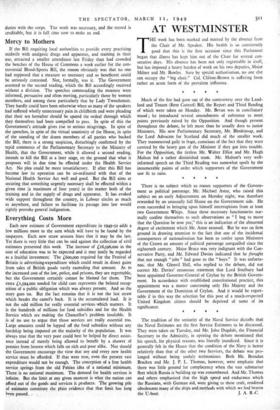AT WESTMINSTER
THE week has been marked and marred by the absence from the Chair of Mr. Speaker. His health is so consistently good that this is the first occasion since this Parliament began that illness has kept him out of the Chair for several con- secutive days. His absence has been not only regrettable in itself, but has imposed a heavy burden of work on his two deputies, Major Milner and Mr. Bowles. Save by special authorisation, no one else can occupy the " big chair." Col. Clifton-Brown is suffering from rather an acute form of the prevalent influenza.
Much of the fire had gone out of the controversy over the Land- lord and Tenant (Rent Control) Bill, the Report and Third Reading of which were taken on Monday. Mr. Bevan was in conciliatory mood ; he introduced several amendments of substance to meet points previously raised by the Opposition. And though present throughout the debate, he left more than he usually does to junior Ministers. His new Parliamentary Secretary, Mr. Blenkinsop, and the Lord Advocate for Scotland did much of the smaller work. They manoeuvred gaily in front, conscious of the fact that they were covered by the heavy gun of the Minister if they got into trouble. For the Opposition, the tireless Mr. Walter Elliot and Mr. Hugh Molson led a rather diminished team. Mr. Molson's very well- informed speech on the Third Reading was somewhat spoilt by the innumerable points of order which supporters of the Government saw fit to raise.
* * * * There is no subject which so rouses supporters of the Govern- ment as political patronage. Mr. Michael Astor, who raised this subject on an early Adjournment on Monday night; was therefore rewarded by an unusually full House on the Government side. He even succeeded in bringing upon himself interruptions from at least two Government Whips. Since these necessary functionaries nor- mally confine themselves to such observations as " I beg to move that the Question be now put," this is an indication of the abnormal degree of excitement which Mr. Astor aroused. But he was on firm ground in drawing attention to the fact that one of the incidental consequences of nationalisation has been to confer upon Ministers of the Crown an amount of political patronage unequalled since the eighteenth century. Major Bruce was very indignant with the Con- servative Party, and Mr. Edward Davies indicated that he %thought that not enough "jobs " had gone to the " boys." It was unfortu- natk. that Mr. Glenvil Hall, who replied to the debate, did not correct Mr. Davies' erroneous statement that Lord Soulbury had been appointed Governor-General of Ceylon by the British Govern- ment. In accordance with established constitutional practice, this appointment was a matter concerning only His Majesty and the Government of the Dominion of Ceylon. And it would be regret- table if in this way the selection for this post of a much-respected United Kingdom citizen should be deprived of some of its significance.
* * *
The tradition of the seniority of the Naval Service dictates that the Naval Estimates are the fast Service Estimates to be discussed. They were taken on Tuesday, and Mr. John Dugdale, the Financial Secretary to the Admiralty, in opening the debate mentioned that his speech, for physical reasons, was literally jaundiced. Since it is generally felt in the House that the condition of the Navy is better relatively than that of the other two Services, the debate was pro- longed without being unduly acrimonious. Both Mr. Brendan Bracken and Mr. j. P. L. Thomas, however, were emphatic that there was little ground for complacency when the vast submarine fleet which Russia is building up was remembered. And Mr. Thomas and others emphasised that the high speed and endurance which the Russians, with German aid, were giving to these craft, rendered obsolescent many of the ships and methods with which we had beaten






































 Previous page
Previous page